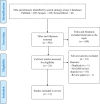Diagnostic Accuracy of FOBT and Colorectal Cancer Genetic Testing: A Systematic Review & Meta-Analysis
- PMID: 31099505
- PMCID: PMC6634323
- DOI: 10.5334/aogh.2466
Diagnostic Accuracy of FOBT and Colorectal Cancer Genetic Testing: A Systematic Review & Meta-Analysis
Abstract
Introduction: Colorectal cancer (CRC) is the second leading cause of cancer related death in the world after lung cancer. Early detection of CRC leads to improvement in cancer survival rate. In recent years, efforts have been made to discover a non-invasive screening marker of higher sensitivity and specificity. Fecal occult blood testing (FOBT) and genetic testing become alternative modalities to screen CRC in the population other than colonoscopy. The aim of this systematic review and meta-analysis is to determine the diagnostic accuracy, sensitivity and specificity of FOBT and genetic testing as screening tools in colorectal cancer.
Methods: A literature search of PubMed, ScienceDirect, and Scopus was carried out. The search strategy was restricted to human subjects and studies are published in English. Data on sensitivity and specificity were extracted and pooled. Heterogeneity was assumed at significance level of p < 0.10 and was tested by chi squared. Degree of heterogeneity was quantified using the I2 statistic, and values of less than 25% is considered as homogenous. All analyses were performed using the software Meta-Disc.
Results: A total of eleven studies were suitable for data synthesis and analysis. Five studies were analyzed for the accuracy of genetic testing, the pooled estimate for sensitivity and specificity were 71% (95% CI: 66, 75%) and 95% (95% CI: 93, 97%) respectively. Another group of studies which had been evaluated for the accuracy of FOBT, the pooled sensitivity was 31% (95% CI: 25, 38%) while the pooled specificity was 87% (95% CI: 86, 89%).
Conclusions: FOBTs is recommended to use as population-based screening tools for colorectal cancer while genetic testing should be focusing on patients with moderate and high risk individuals.
© 2019 The Author(s). This is an open-access article distributed under the terms of the Creative Commons Attribution 4.0 International License (CC-BY 4.0), which permits unrestricted use, distribution, and reproduction in any medium, provided the original author and source are credited. See http://creativecommons.org/licenses/by/4.0/.
Conflict of interest statement
The authors have no competing interests to declare.
Figures
References
-
- World Health Organization (WHO). Cancer; fact sheet no 297 2014. Available from: http://www.who.int/medacentre/factsheets/fs297/en.
-
- American Cancer Society. Colorectal Cancer Facts & Figures 2011–2013; 2013.
-
- Ministry of Health. Clinical Guidelines Practice: Management of Colorectal Cancer Malaysia Health Technology Assessment Section (MaHTAS) 2017.
Publication types
MeSH terms
LinkOut - more resources
Full Text Sources
Medical




